ICPMS-2030 - Features
Inductively Coupled Plasma Mass Spectrometer
Two Assistant Functions Simplify Analysis
The Development Assistant simplifies the process of developing analytical methods. The Diagnosis Assistant automatically diagnoses spectral interference. Together, they provide analytical results with exceptionally high reliability.
Development Assistant Function Ensures Analytical Methods
Can Be Developed with Confidence by Anyone.
Development Assistant
Creating analytical methods for ICPMS-2030 Series analysis involves only selecting the measured and target elements, even for samples being analyzed for the first time. Then, based on the qualitative analysis data (for all mass numbers) from a representative sample, the Development Assistant automatically selects the optimal mass numbers and internal standard elements for the target measurement elements and automatically specifies the concentration range for calibration curve samples.
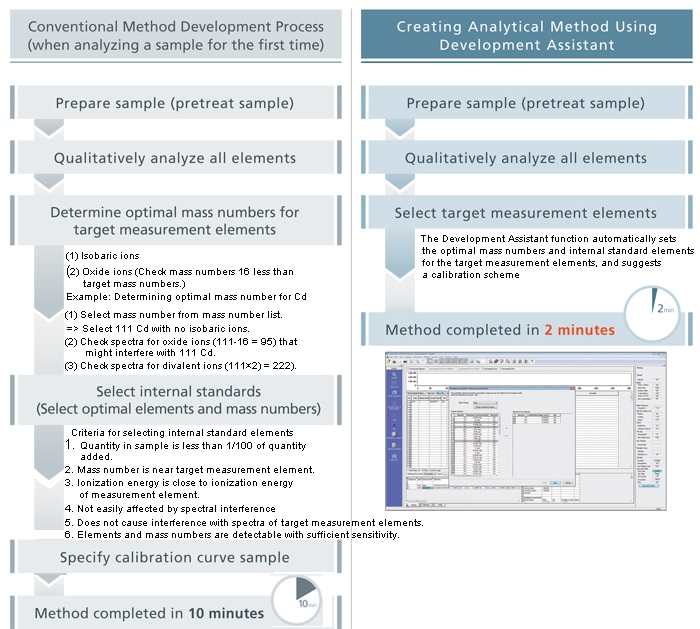
Obtain Reliable Results Quickly with the Diagnosis Assistant Function.
Diagnosis Assistant
The Diagnosis Assistant automatically diagnoses spectral interference, based on data measured from all mass numbers. Even when using an already established method for routine analysis, the software analyzes data for any spectral interference to determine if a problem occurred.
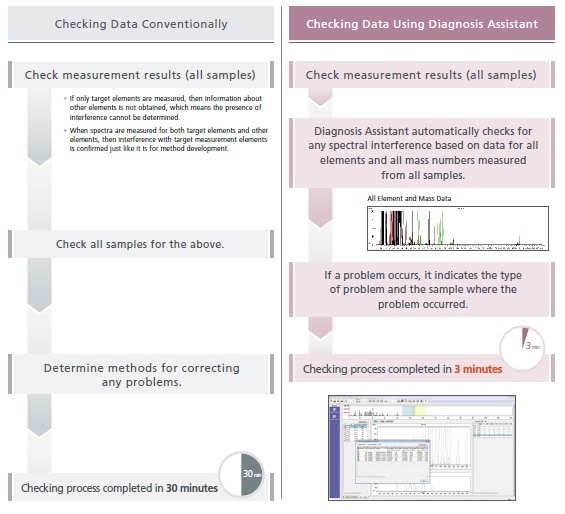
Higher Sensitivity and Lower Interference
Achieve High-Sensitivity and Low-interference Analyses Using Newly Developed Collision Cell
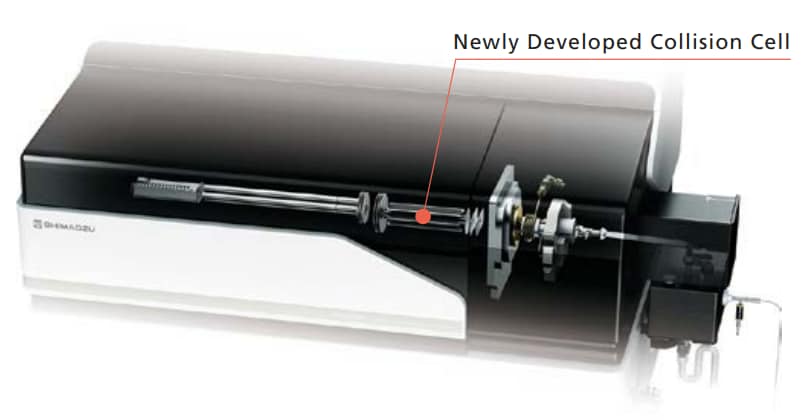
With this newly developed collision cell, polyatomic ions that previously may have been detected as spectral interference are efficiently eliminated by helium gas flowing through the cell, allowing the high-sensitivity analysis.
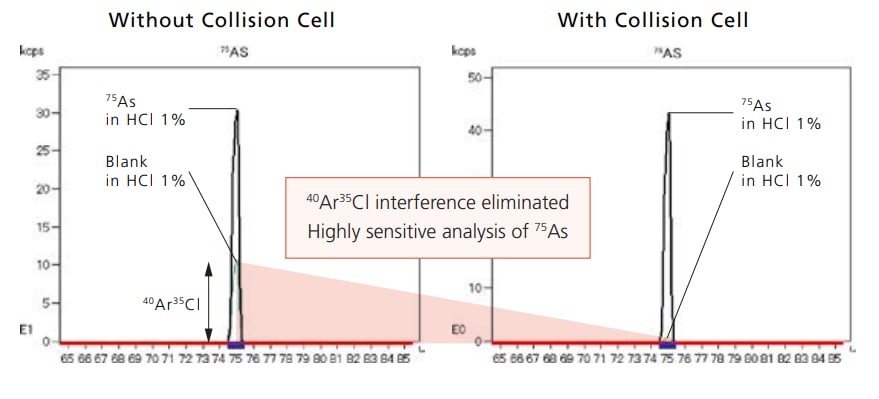
Quantitative Analysis of 75As
If chlorine is in the sample when performing quantitative analysis of 75As, 40Ar and 35Cl combine to form 40Ar35Cl, which overlaps the mass number of As, creating interference.
The collision cell eliminates the spectral interference from Cl, enabling the highly sensitive measurement of As.
On-Line IEC (Inter-Element Correction)
Shimadzu's proprietary On-Line IEC (Inter Element Correction) provides correction for spectral interference that could not be eliminated with the collision cell. Since the interference correction coefficient can be acquired only by a single measurement of a standard sample of the interfering element, the correction can be simply and accurately made. There's no need for complicated assessments of conditions, as with reaction cell technology.
Quantitative Analysis of 78Se
If 156Gd is in the sample when performing quantitative analysis of 78Se, spectral interference will occur with respect to 78Se.
By measuring a standard sample of Gd, the correction coefficient can be obtained. Then, the portion where interference occurs can be corrected when measuring the unknown sample, and the accurate quantitation of 78Se can be accomplished.

Unique Combination Eco Mode/Mini-Torch Reduces Running Cost by Dramatically Reducing Gas Consumption
In addition to lower running costs, the environmentally-friendly mini-torch plasma unit, developed by Shimadzu, minimizes the energy (electricity) consumed in producing and maintaining an argon plasma.
Three Factors That Reduce Running Costs
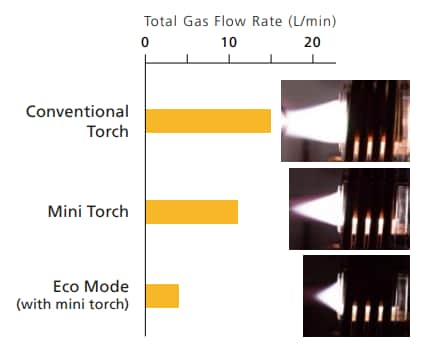
Mini-Torch Plasma Unit
One of the highest costs associated with ICP-MS systems is the large quantity of argon gas they consume. However, Shimadzu's proprietary mini-torch plasma system consumes 2/3 the argon gas (11 L/min) as conventional plasma torches. Consequently, one gas cylinder of argon (~7,800 liters) allows for approximately ten hours of continuous operation.
Eco Mode (5 L/min of Plasma)
During standby when Eco mode is active, the plasma gas flow and power are reduced to 5 L/min and 0.5 kW to minimize the required gas and electricity; however, analysis can be started immediately with no loss of productivity
Low-Purity Argon Compatible
High-purity argon gas required by conventional systems is no longer necessary. Using less expensive argon gas (99.95%) can reduce costs.

This product is certified as Shimadzu's Eco-Products Plus. Reduced argon gas consumption by 33% compared with conventional Shimadzu's products.
Enhanced Maintenance Features
The opening to the plasma stand is wide, allowing easy access to the plasma torch and interface unit. The interface can be easily removed by loosening captive screws by hand.
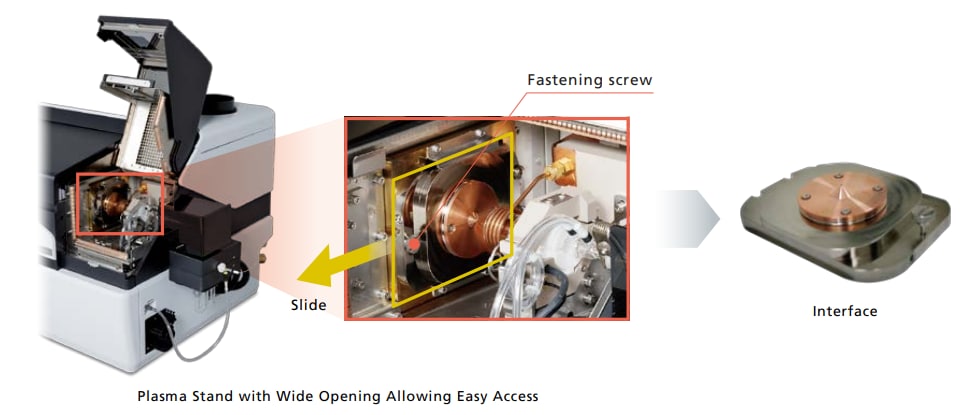
Designed for High Stability and Low Running Costs
New High-Frequency Power Supply!
Shimadzu is the world's first ICP manufacturer to develop an all-solid-state high-frequency power supply. Due to Shimadzu's extensive experience, this free-running type high-frequency power supply unit offers the highest output stability.
* As of February 2016, based on data obtained by Shimadzu
More Compact Vacuum System!
The smaller three-stage split-flow turbomolecular pump is especially easy to maintain, maximizing up-time of the instrument.
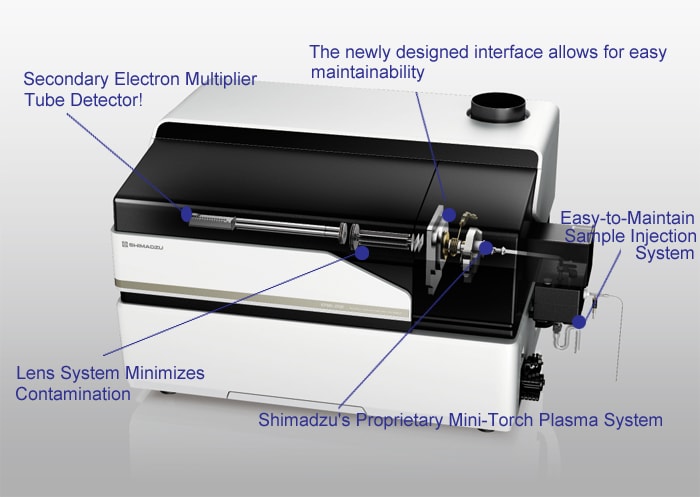
Secondary Electron Multiplier Tube Detector!
The 9-digit dynamic range detector allows for measuring major components and trace components simultaneously with high sensitivity.
Lens System Minimizes Contamination!
Located behind the newly developed collision cell, the focusing lens improves ion transmission efficiency and elimination of light emission from the plasma.
* Light emission removal is especially important when combining with Laser Ablation systems.Newly Developed Collision Cell!
The newly developed collision cell achieves superior sensitivity by providing highly efficient molecular ion removal and high elemental ion transmission using only helium gas.
Newly Designed Interface!
The newly designed interface allows for easy maintainability. All parts can be removed and installed without the need for tools, which helps minimize downtime associated with cleaning and servicing.
Shimadzu's Proprietary Mini-Torch Plasma System
Shimadzu's proprietary mini-torch plasma system consumes two-thirds the argon gas (11 L/min) as conventional plasma torches.
Furthermore, during standby when Eco mode is active, the plasma gas flow and power are reduced to 5 L/min and 0.5 kW to minimize the required gas and electricity.
Easy-to-Maintain Sample Injection System
Cyclone Chamber Cooled by a Peltier Element
The sample injection system features an electronically-cooled cyclone chamber utilizing a highly efficient coaxial nebulizer and unique overflow drain design. This design combines highly efficient aerosol production while reducing carryover to maximize sensitivity and throughput.
LA-ICP-MS Software
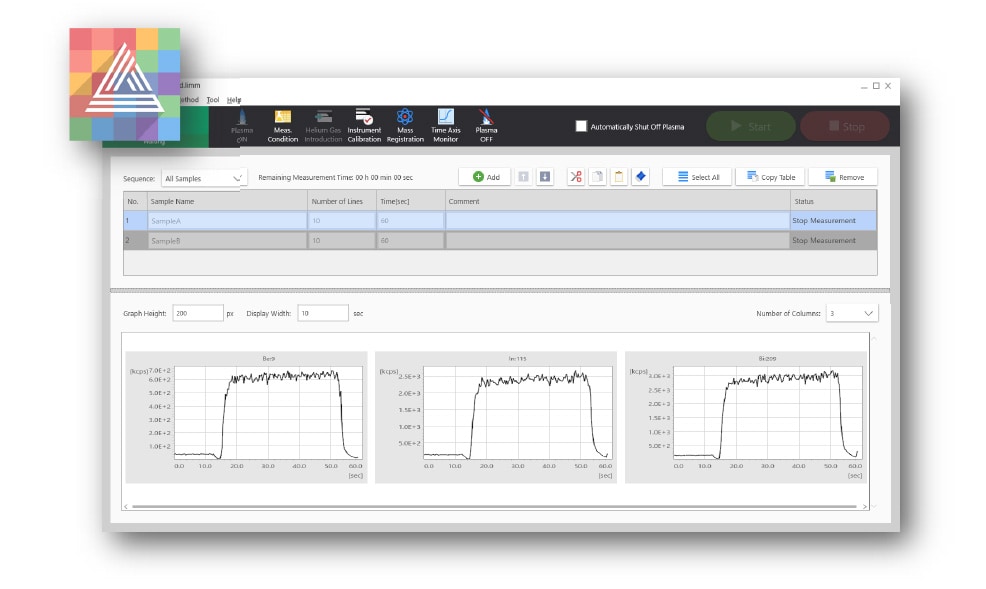
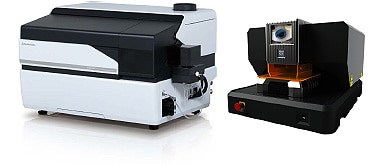
By combining this software with ICPMS-2030 connected to a laser ablation instrument, sample measurement and data output in a format compatible with imaging data analysis software are possible.
Batch registration of line scan information
The sample information can be entered using the image of the irradiation area (Number of lines x irradiation time) set by the laser ablation instrument. Reduce the time and effort required to enter information to 1/10 or less*.
*When 10 or more lines are registered
Supports imdx format
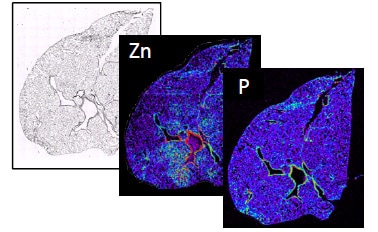
The data of the output imdx format can be read as it is by Shimazu Mass Spectrometry Imaging Data Analysis Software IMAGEREVEALTM MS. You can start the analysis immediately without converting the data.
Data output per sample
The acquired data is output as one data file per sample. Prevents missing or mixed data when multiple line data are selected and output.
Sample Information Input Method Specialized for Imaging
Batch registration of line scan information
LA-ICP-MS imaging is a collection of laser irradiation lines. In the past, information for each line had to be entered into the ICP-MS. "LA-ICP-MS Software" uses a 1-sample input method to reduce the time and effort required to input information. You can enter up to 10,000 lines of information on just 1 line.
Data output per sample
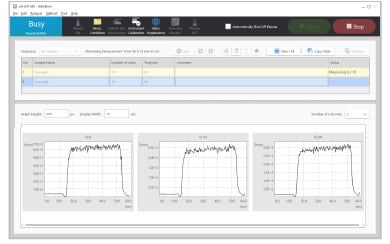
Main Window
In order to analyze the imaging data, it is necessary to output the data for each sample. The Shimadzu LA-ICP-MS software outputs one data file each time the measurement of one sample is completed. Unlike conventional software, it is not necessary to select and output line data after measurement.
Measurement information is also included in the data file, making it easier to manage the data and preventing human error such as mixing of data measured under different conditions.
Mass Spectrometry Imaging Data Analysis Software IMAGEREVEALTM MS
Supports imdx format
Since the data is output in the data format imdx of Mass Spectrometry Imaging Data Analysis Software IMAGEREVEALTM MS, it can be opened directly by IMAGEREVEALTM MS and the analysis work can be started immediately. You don't need to convert data or create your own software to read data. It is also easy to combine the organic images of the MALDI TOF MS and iMScope series with the inorganic images of the LA-ICP-MS.
Multimodal Imaging System
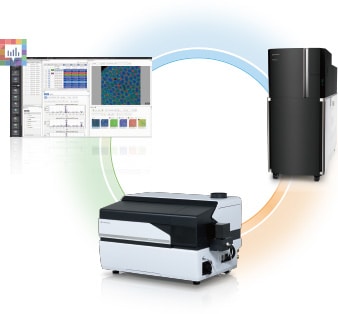
MALDI-MS molecular imaging data and LA-ICP-MS elemental imaging data can be analyzed using a single software solution. That makes multimodal imaging more accessible.


